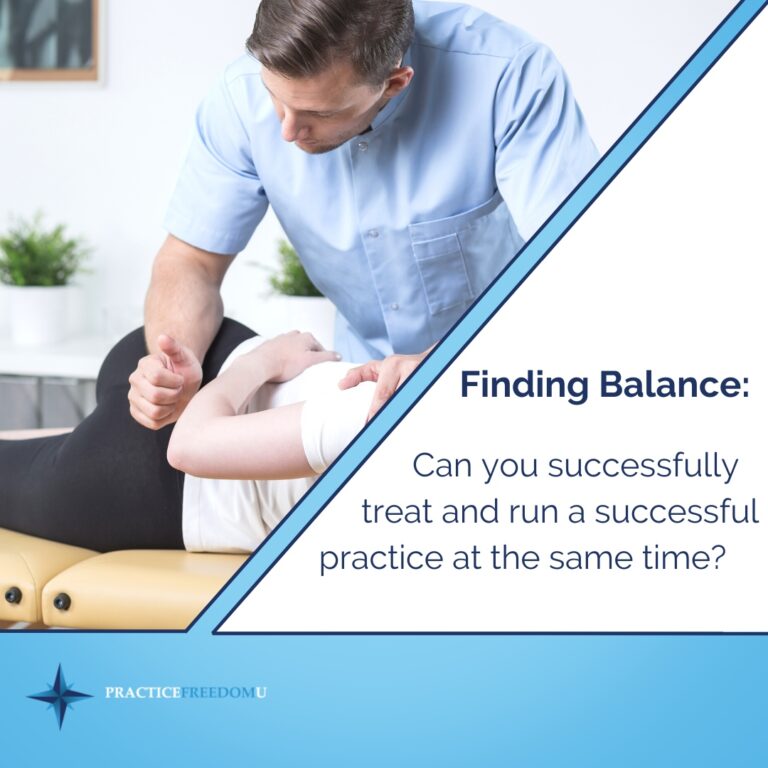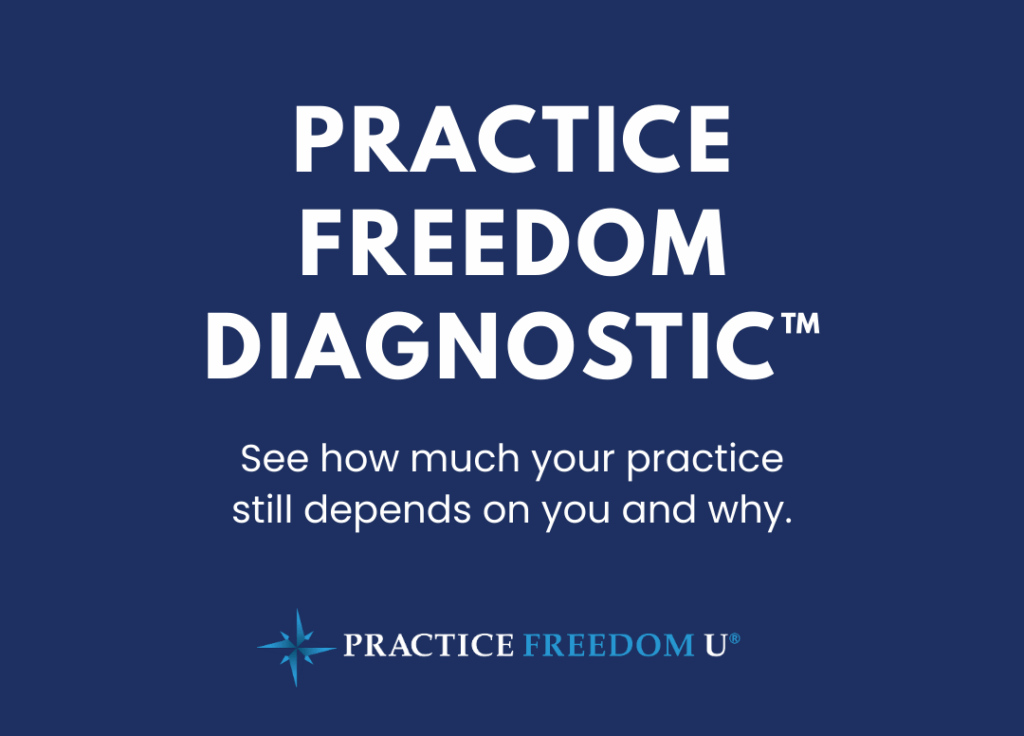“Can I continue to treat clients and run a successful practice?”
Practice owners ask me this question often. If you are a practice owner who is also actively treating clients, you already know the challenges of juggling all of the activities that are involved in running a successful practice and treating patients. If you are feeling tired all the time, feeling like things are falling through the cracks, or discovering that the practice is draining your energy rather than positively feeding your life, it is time for a change. It is time to stop juggling and discover the freedoms that can come from owning your own practice rather than the practice owning you.
You got into this clinical profession because you wanted to help people. You very likely love helping people and probably always have. You also love figuring things out – like playing Sherlock Holmes to figure out the mystery of what’s ailing somebody. You like to use your intelligence to solve problems. You also like to feel appreciated while working with people to help them help themselves feel better. Ultimately, you got into the profession because you wanted to make a difference in the lives of people and the community. Chances are high that by now you are very good at it.
After some years working in someone else’s practice, you found yourself wanting to expand your possibilities. Maybe you weren’t feeling fulfilled at the job you had. You found yourself wanting more. What you likely wanted were freedoms. Freedom to earn more money. Freedom to manage your own time. Freedom over when to take a vacation, to manage sick days, and when to spend time with your family. You wanted to choose the people you work with. You wanted to choose the patients you would treat. You wanted to choose relationships with referral sources. You wanted the opportunity to work in an environment where other people were not making all of the choices for you. You wanted the freedom to make choices for yourself.
So, you decided to open up your own practice.
Practice Freedom
You decided to pursue the opportunities available each day rather than to continue working for someone else, feeling limited in your choices. You opened your own practice. The freedoms of owning your own practice include the following.
- Fulfillment. Maybe working for someone else left you feeling unfulfilled. Finding fulfillment in your daily work may have been your main reason for leaving your job and starting your own practice. We all want to know that what we are doing is making a difference and to feel fulfilled in the work we do each day.
- Time. As practice owner, you are in complete control of your time (even if it doesn’t feel like it right now). How you spend time, how you schedule clients, how you invest time in building your practice are all now in your control. You have the freedom to make time management decisions that will help you grow your practice, to achieve your goals, and to help you achieve that sense of fulfillment you were looking for when you started your practice.
- Money. Freedom to earn what we want to earn is a big reason most of us started our own businesses. As helping professionals, money may not have been your number one driver. However, the opportunity to balance freedom, flexibility, and how much money we make is a part of the freedom found in owning a practice rather than working for someone else.
- Referral relationships. As the owner of your own practice, you have the freedom to choose with whom you will build referral relationships. You get to determine whether you are mutually referring clients, or not.
- Patient choices. As the owner of your own practice, you have the freedom to work only with people who have insurance, work only with people who have certain kinds of injuries, work only with people focused on improving their athletic performance, or to work with everyone. As the owner of your practice, you can guide patients into making better choices for their well-being. And if you discover that a patient is not taking positive action – such as doing the recommended exercises between sessions with you – you have the freedom to decide to no longer work with that patient.
- Decision-making control. You get to determine where to have your office, what your hours will be, whom to hire and when. You get to determine what suppliers you will use. You decide how your practice will operate day by day. You are the decision maker, the leader, and the mentor who helps the people in your practice learn to make good decisions for the practice.
From Juggling Your Roles to Practice Freedom
As a practice owner, you are juggling three main roles or job sets.
- First is the role of clinician. Your training prepared you to treat clients, to have clinical knowledge and skills, and to recognize when a client is benefitting or may need different treatments.
- Administration is another role. There is paperwork involved in every practice – lots of it. There are also the administration activities of scheduling, coordinating deliveries, reminder-calling clients, managing vendors, and all of the duties that keep the office functioning on a daily basis.
- Management is the third role. This is the manager, owner, leader, and director set of duties that guide the practice to success – or leave it floundering in search of success. This role also calls for an entrepreneurial mindset.
If you are like 85% of small practice owners, then you are most likely in the role of committed clinician or overwhelmed operator. This means that you’re spending most of your time as a practicing clinician treating clients. Treating people as well as handling administrative and management duties leaves you with very few hours to enjoy the rest of your non-practice life. You didn’t start your own practice to become exhausted by the role juggling!
I believe that in order to create a practice that gives you freedom, you must embrace the roles of entrepreneur, leader, and owner. Initially this may be a difficult transition because you are focused on operating each day as a full-time clinician. An entrepreneur and a clinician have fundamentally different mindsets. A clinician’s focus is on individual clients, meeting their needs for improved health and making suggestions for ongoing daily actions that can improve each client’s health. An entrepreneur creates new services, markets the practice, has a vision for the growth of the practice, mentors others and is a consummate opportunity seeker while also building relationships and leading the practice.
If you are the only full-time PT or clinician in your practice, you’ll discover that juggling your practice roles and responsibilities and working as a clinician often works against the very reasons you started your own practice. So, it’s time to revisit the opening question.
Can I treat clients and run a successful practice?
The clear-cut answer is: NO. I’ve yet to meet anyone who has stayed fully scheduled as a clinician and at the same time been able to grow a successful practice. If you are treating a few patients a week, that is one thing and can be managed as a part of your practice owner schedule. If you are fully scheduled as a clinician, your administrator, manager and owner/leader duties are not getting the time and attention needed to run the practice, let alone grow the practice.
It is difficult to solve practice operation problems, to identify marketing opportunities, or to build new referral relationships when your time is largely scheduled to treat clients. Take a look at your week. How much time do you spend on the three roles described above: clinician, administrator, manager?
Focus your time on becoming a great mentor to the employees you hire so that you can achieve practice freedom. Or, if you don’t have employees, start looking at who your first hire should be and then hire them. Invest your energy in setting a vision for your practice and identifying what needs to be done each week. Once you’ve achieved your practice freedom goals, then you can return to a more active role as clinician. Until you’ve achieved your freedom goals, focus your energy and time on being a leader, a visionary and entrepreneur so that you can build a successful practice. Embrace your role as a visionary entrepreneur. Allow other people who are passionate about treating and taking care of people to fill the full-time clinician role. When we share our vision, mentor our team members and teach others how we want things to be done, we can exponentially take care of people while maintaining our practice freedom. When you take this approach, there will always be time to pick a few patients with tough challenges that you want to solve. You may also choose to focus your time on a new set of challenges, how to continue growing profitably and continuously but you’ll do it on your own terms.
Has juggling your practice roles and activities become overwhelming? I’d be happy to talk with you. Just click this link to schedule a Discovery Call.


